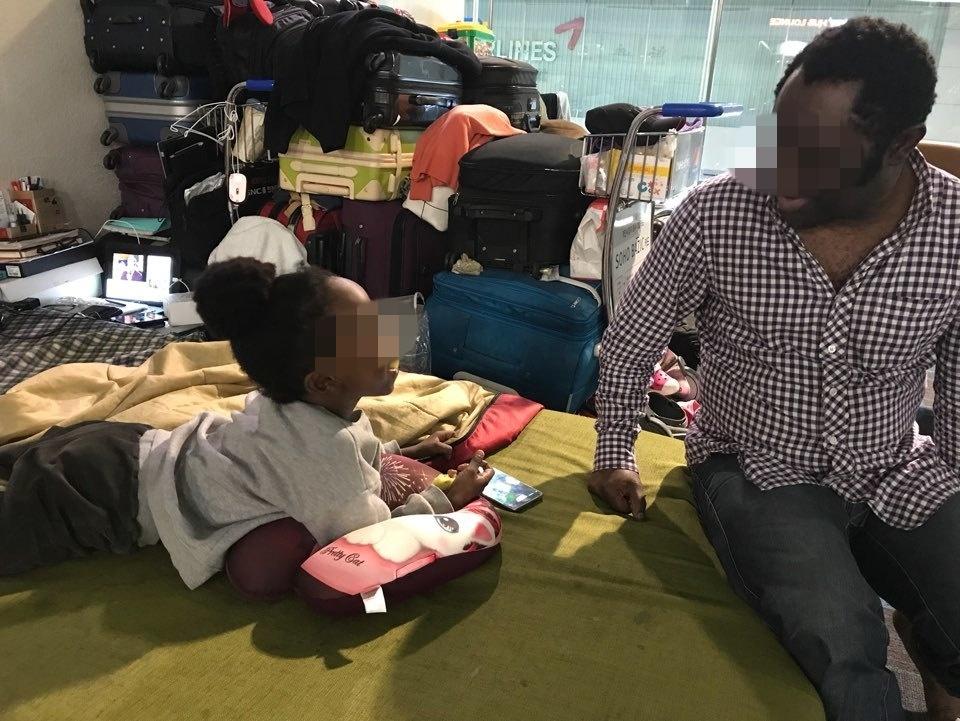Four trembling children are sprawled across a makeshift bed consisting of lightweight jackets and quilts. Their parents reach for a stack of suitcases and luggage trolley carts lying by a glass pane.
After fleeing Angola, Nkuka Lulendo, his wife, and four children were stuck in Terminal 1 of Incheon Airport for nine months. All of the family’s attempts to gain refugee status throughout the year were ruled against by the Incheon District Court (IDC). However, on Sept. 27, a judge at the Seoul High Court reversed the IDC’s decisions, finally granting the Lulendo family refugee status and entry into Korea.
Following the Luanda government’s ban on street vendors from large areas to reduce congestion and clean up the cities, “removal operations” consisting of police officers viciously beating and robbing street traders became common. Attempting to avoid hitting pedestrians fleeing from police in a riot, taxi driver Nkuka Lulendo swerved to his right, accidentally hitting a police jeep.
“Six or seven policemen approached me as soon as I hit the car. Once they noticed I was Bakongo, more policemen came,” said Nkuka. Thousands of Bankongos have been displaced because of the ongoing Cabinda War and are subject to xenophobic attitudes in countries they seek shelter in. “They began threatening me, and their boss decided to throw me in jail on the spot. No trial, nothing, just to sabotage me because I was Bakongo. I was tortured over and over in ways you couldn’t imagine. I would cry.”
On the tenth day of Nkuka’s imprisonment, a Bakongo policeman helped him escape, dropping him off in a Bakongo dominated region. Seeking refuge in a church, Nkuka explained what had happened, received medical treatment, and called his wife.
“My wife informed me that on the same day I had been released from the jail, policemen had gone all the way to my house and to rape her.”
Having been informed by fellow Bakongos that they were in danger, and it was in their best interest to flee, Lulendo began visiting different embassies to obtain visas. The only embassy located in his neighborhood was the Korean Embassy.
“We tried our luck there, and they gave us visas. We didn’t intend to come here—we just had to flee right away.”
However, upon arriving in Korea, the Lulendos were informed that they did not meet the requirements to obtain refugee status. The IDC cited an absence of grounds for applying for refugee status, including a possible attempt to gain refugee status for purely economic reasons. As a result, they were unable to leave the airport. Rather than providing the displaced family with assistance, the Korean government not only tried to repatriate them 4 times but also refused to put them in contact with organizations such as UNHRC Korea.
“We had nothing. My kids couldn’t study for nine months, only ate two meals a day, and bathed in public bathrooms. It was heartbreaking for me” said Bobette, Nkuka’s wife. “We didn’t even have blankets to cover ourselves. Imagine sleeping with no roof during the wintertime. We were practically outdoors. ”
“I would tremble at night,” said Rhema, Nkuka’s nine-year-old son. “People passing by would point their fingers and mock us sometimes.”
The family is now residing in temporary shelters set up by volunteers in Ansan. Volunteers are also gearing up to provide the Lulendo family with stable residence, and education and resources.
“We are grateful for how compassionate some Koreans have been,” Nkuka said. “We came here with 4 suitcases. We had over 30 suitcases when we left the airport. Koreans came all the way with cases packed with food and clothing. We couldn’t have survived without them.”
Under the leadership of Jesica De La O, MS MUN advisor, middle school students at SIS have run clothing drives and are currently selling Halloween-o grams.
“I’m attempting to inform students about the wider issue of the plight of Refugees in South Korea,” said Ms. De La O. “South Korea was the first Asian country to adopt refugee legislation when it passed the Refugee Act in 2013 but the acceptance rate of refugees compared with other developed nations is still very low, around 4%.”
South Korea grants an astonishing 4.2% of refugee applicants refugee status, far lower than international standards. While it takes a minimum of a year to be decided as a refugee, refugee applicants aren’t permitted to find a job for the first 6 months and are not provided with health insurance. To make matters worse, the government can only manage to support 7% of refugees. As a result, getting by is virtually impossible for most of Korea’s refugees. Yet, Nkuka and his family remain positive as they preserve through their dire situation.
“We simply cannot give up. There are thousands like us, and there will be thousands more,” Nkuka says, smiling wistfully as he straightens Rhema’s shirt. “We just hope that we eventually will be treated for what we are.”
While some may reduce Nkuka and other displaced individuals to undesirable aliens, economic migrants, and draft dodgers, we must not forget. They are innovators. Sisters and brothers. Parents. Mentors. Lovers. Friends. They are human.

